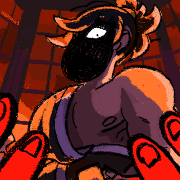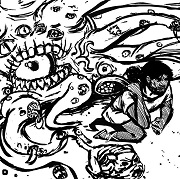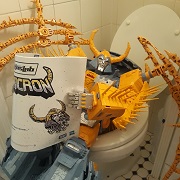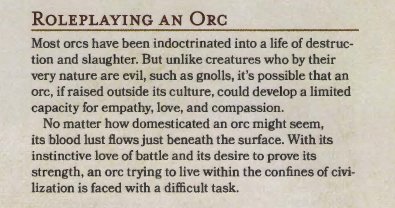|
Oh and moving away from hyphz's issue, but just talking more about pbta and other games where stuff is improv, how do y'all like to handle the stakes and results of partial successes/complication results? Do you and your group generally prefer to be surprised by what happens after the dice are rolled? Or have the stakes laid out? For that matter on mixed results do you prefer "You succeed but here's the downside..." or "You can still do X, but if you do..." style bargains? Also, does your group like security/generally knowing it's gonna follow one model, or like mixing it up? Like for example in the DW game I'm running I try to mix it up. Usually stuff is all "above board" but I have thrown in a few surprises, and I usually only like giving the offer of "Ok based on the dice you can either give up, or do it but.." when it's introducing consequences and friction to the party, like "Sure you can save the cleric from getting grabbed by the monster, but you'll get grabbed instead ranger. Do you still want to?" I can see where that could lead to trouble in other groups, or make someone feel picked on when another player got to back out of something, but they didn't, or they had more of a surprise downside, whereas the other player knew exactly what the costs were before rolling. Coolness Averted fucked around with this message at 07:56 on Apr 28, 2020 |
|
|
|

|
| # ? Jun 8, 2024 18:27 |
|
Hi, it's me, the guy who has never played a narrative game before. All of my experience is in boring D20 systems and stuff like Twilight 2000. I'm about to play my first PbtA game, the Flying Circus game on our very own Game Room board. Any tips? I'm actually nervous about bringing in bad habits from the systems I know.
|
|
|
|
PinheadSlim posted:Hi, it's me, the guy who has never played a narrative game before. All of my experience is in boring D20 systems and stuff like Twilight 2000. My big PbtA tip is: you can do a lot of stuff without rolling dice. Dice only happen if you trigger a move. While you're just having the conversation of what your character does between missions, the GM will say "ok" a lot. The focus on the Conversation and the Fiction are the big PbtA conceits, every game does them but PbtA games lean into them.
|
|
|
|
PinheadSlim posted:Hi, it's me, the guy who has never played a narrative game before. All of my experience is in boring D20 systems and stuff like Twilight 2000. Ignore your moves. At least the basic ones. There's a natural tendency from more traditional RPG sets to think about what your character will do in terms of what the rules have mechanics for: in combat you attack with your melee weapon, because that's what there's a whole big section in the Combat chapter about how to do, for example, and maybe you wrap the fiction around that (with a cool description of your attack, maybe). In PbtA games, the flow is the opposite: You describe what cool thing you want your character to do, then the GM (and the rest of the players, probably) help you figure out if that maps to a move you should trigger, or if it just works or not. So the thing I always tell new PbtA players is to forget about the basic moves altogether and just focus on what your character actually does in the fiction.
|
|
|
|
PinheadSlim posted:Hi, it's me, the guy who has never played a narrative game before. All of my experience is in boring D20 systems and stuff like Twilight 2000. Don't assume failure is going to be straight forward, and be ready for action not to necessarily flow in "turn order" like especially combat in pbta isn't generally "ok everyone goes once, then everyone goes a second time." Like the GM might have you do two or three things in a row. Also be ready for failures to not necessarily be stuff like "Jane attacks, and the counter attack does damage to her" the failure conditions can put other characters in danger or rough spots and require their attention. What I really like about the system is it's not "ok the game operates on one system for combat, and one for skill challenges, and one for social stuff." Have fun! And remember the GM will never punish you for doing interesting things or trying to advance the story. There aren't wrong answers or choices. Coolness Averted fucked around with this message at 09:08 on Apr 28, 2020 |
|
|
|
PinheadSlim posted:Any tips? I'm actually nervous about bringing in bad habits from the systems I know. A miss doesn't necessarily mean the action the PC took failed. That's a possible outcome of course but not the only one.. GimpInBlack posted:In PbtA games, the flow is the opposite: You describe what cool thing you want your character to do, then the GM (and the rest of the players, probably) help you figure out if that maps to a move you should trigger, or if it just works or not. So the thing I always tell new PbtA players is to forget about the basic moves altogether and just focus on what your character actually does in the fiction. The last part of this advice is fine for newbies, to make sure they don't go over the move list every time they want to take action, but I disagree on the first part. Players are absolutely allowed to name the move they want to roll. As the MC, you'll want to make sure they're also telling you how their character is doing it in the fiction and not just listing the name. You might tell them a different move applies or that they don't need to roll for whatever reason, but "players should never name their moves" is something I see stated that is incorrect.
|
|
|
Elector_Nerdlingen posted:I typed out a post here but I deleted it because I think this is where Hyphz and I actually disconnect.
|
|
|
|
|
Thanks everyone, your posts helped me a ton. Especially the stuff about turn structure. It's hard to imagine how it'll play out but I'm sure once other people post their turns I'll get a real idea of what to do.
|
|
|
|
PinheadSlim posted:Thanks everyone, your posts helped me a ton. Especially the stuff about turn structure. It's hard to imagine how it'll play out but I'm sure once other people post their turns I'll get a real idea of what to do. The GM will ask "X happens, what do you do?" sometimes just to the group in general, sometimes you specifically. So that'll be a good queue of when to act.
|
|
|
|
Since there seems to be a lot of PbtA vets in here, I might as well toss out a question to the crowd. I've recently started GMing mine and my groups more-or-less-first (we played a one-shot of dungeon world in the past) PbtA campaign. It's Masks, for what that's worth. It's overall going well, but recently I had a villain activate a move to teleport out of combat when the going started getting rough for them, and one of my player was sort of upset since he "couldn't do anything about it". This same player also seems constantly so wary of taking the "wrong move" that he'll consistently stall out when I try to ask him what his character does. Are there any tricks or tips to helping him come to terms with the fact that failing is part and parcel of PbtA, and in fact makes things more entertaining? I think he's having a hard time coming out of the D&D ultra tactical mindset. Oh, and on a tangential but connected note, I'm still pretty uncertain about when it is appropriate to use a hard move. I feel like I'm using them way too sparingly and it's making my threats too non-threatening as a result, but the conversation never seems to give me a clear opening for a villain to do a big fancy thing. Infinity Gaia fucked around with this message at 10:34 on Apr 28, 2020 |
|
|
|
PinheadSlim posted:Thanks everyone, your posts helped me a ton. Especially the stuff about turn structure. It's hard to imagine how it'll play out but I'm sure once other people post their turns I'll get a real idea of what to do. One thing I always tell new pbta players is to say what's obvious and do what's obvious. It's an "if you get stuck" tool. So the GM turns to you and says "...what do you do?" and you get that deer-in-headlights feeling, just say what's obvious to you. It probably won't be what was obvious to everyone else, and even if it is, so what? Nessus posted:You know, this honestly made me understand PBTA a lot better, and it also helped me understand why I tune out of a lot of tabletop RPG sessions I'm in - because so much of it goes into forming plan and counterplan often in a way that isn't all that great. It's only my opinion and I don't really have any way to back it up, but I feel like a lot of stuff that Apocalypse World just a rephrase of how D&D etc work. Like, "to do it, do it" is just how combat in D&D works. You don't get to theorycraft out "what if I tried hitting him with my sword" and see what the result would be before you commit. You state your action and roll the dice and see how it comes out. This shouldn't be a foreign concept.
|
|
|
|
Well I made my first post in the game thread, as the game goes on feel free to tear me apart ITT and give criticism, I'll need all I can get lol
|
|
|
|
Elector_Nerdlingen posted:
I’ve had this thought for a while too (mostly about the MC Principles and hard moves); a lot of AW seems to me to just be a codification of best practices, presented as explicit, actionable bullet points. Which I think explains a lot of the bafflement and hostility towards it you get from certain “old-school” sorts: “This is nothing special, I’ve been doing this for years” and “how dare this game try to give me orders.” (See also the response Gumshoe gets from veteran CoC GMs)
|
|
|
|
Elector_Nerdlingen posted:One thing I always tell new pbta players is to say what's obvious and do what's obvious. It's an "if you get stuck" tool. So the GM turns to you and says "...what do you do?" and you get that deer-in-headlights feeling, just say what's obvious to you. It probably won't be what was obvious to everyone else, and even if it is, so what? There is a reason I say that you can read the dungeon world (or any of the pbta flavors really) and pull a lot of really valuable stuff out to use in other games. By codifying a lot of the things you just sort of do normally when playing, it opens you up to expanding how you think about stuff past just your character sheet. Sometimes it can lead to people realizing limitations of the system they're in, letting you try out other systems or coming up with homebrew hacks to improve your experience. For example, just taking the ideas of how pbta handles failed rolls and applying them to skill checks in d&d/pf improves them *immensely*. Definitely agree in general that a ton of the stuff is just "this is how to do roll play better", and some of it is different system stuff. Almost the entire GM section is usable for any system, and the only parts that aren't are basically the system specific combat bits. PinheadSlim posted:Well I made my first post in the game thread, as the game goes on feel free to tear me apart ITT and give criticism, I'll need all I can get lol Just do what you think your character would do, or what you think would be fun/interesting. One of the great things about pbta games is that you don't need to play in a super tactical way or carefully plan your character so they don't end up worthless. I phrased that sort of poorly though. I guess I mean that there isn't one optimal way to play your character, and the game isn't balanced around said optimal way. So there are things you can do to be more effective, but the game doesn't fall apart if you decide your low INT fighter thinks the biggest threat *has* to be the other big fighter and not the scrawny wizard.
|
|
|
|
Coolness Averted posted:Oh and moving away from hyphz's issue, but just talking more about pbta and other games where stuff is improv, how do y'all like to handle the stakes and results of partial successes/complication results? There's always going to be some point where you're adlibbing the consequences. If you feel like you might be being unfair there, one thing to add to your toolbox is the Blades in the Dark ideas of "position" and "trading position for effect". Position is controlled, risky, or desperate, with "risky" as the default unless it's obviously one of the other ones. When you're controlled you have a hard bargain to get what you want but lose your control. When you're risky you get a worse outcome and the risk catches up to you. When you're desperate you have an ugly choice since something must go wrong. Trading position for effect means you can accomplish more than you planned but for worse consequences. So for saving someone from getting grabbed in a desperate position, "you or them" is a good choice. But if it's just regular fighting so far and you could just regular risky adventurer-style make it over there, the worse outcome might be just "but it catches you a glancing blow", and if you still want to offer options you can offer a trade for effect "but you'll definitely be vulnerable doing it. You could take a glancing blow and get away, or lean into it and take a serious cut at this thing - you'll do your damage to it but get grabbed yourself". Then you just need to tell people what kind of position they're in before they go for it, without necessarily spelling out the consequences.
|
|
|
|
Coolness Averted posted:Oh and moving away from hyphz's issue, but just talking more about pbta and other games where stuff is improv, how do y'all like to handle the stakes and results of partial successes/complication results? As a player, if I want to know the consequences of a failure or partial success I'm going to ask about it. And if I do that, it's because I'm worried about what could happen if this roll goes bad and I don't want to ruin everything. I do it because I'm invested. I guess what I'm saying is, tell people what the consequences of a low roll will probably be if it seems like they're worried about it. Don't do it all the time since that would slow the game down, but do it enough that they can get a feel for how you're running consequences.
|
|
|
|
Elector_Nerdlingen posted:It's only my opinion and I don't really have any way to back it up, but I feel like a lot of stuff that Apocalypse World just a rephrase of how D&D etc work. One part of AW, is that Vincent definitely tried to express his theory for how mechanical resolution should occur in the design, and “to do it, do it” is a part of that theory. Most games handle resolution similarly, but D&D is definitely the ‘standard’ in this regard.
|
|
|
|
Lurks With Wolves posted:As a player, if I want to know the consequences of a failure or partial success I'm going to ask about it. And if I do that, it's because I'm worried about what could happen if this roll goes bad and I don't want to ruin everything. I do it because I'm invested. Another couple things that sometimes come up: you might think of something that seems obvious but maybe the player overlooked it. Relatedly, sometimes the natural difference in the head about what exactly is happening means that a player might want to do something that is much riskier or .. ill advised.. than they think. Phrasing a choice there lets the player in on your frame of reference. Like a prime example in my head is a game where I (player) wanted to pull a gun and get our party into a mexican stand-off situation (and give our fast talk player time to shine, and our sneaky player who was off alone time to do things), but the dm just had combat start.
|
|
|
|
Leperflesh posted:It's not always necessary, particularly when improvising, to make sure the PCs can "get ahead by making good choices." That's not the only or even the primary thing PCs are trying to do most of the time anyway. I see the argument but at the same time, that feels like it could be used to justify any level of railroading. I want the PCs to have agency, and what PCs are going to do with that agency is to try to make things better for themselves (by whatever measure) because that is what people generally do with agency. Elector_Nerdlingen posted:They told you their desired result but so what? I want you to give me twenty bucks <stares expectantly>. Nothing? I'd have to do something to get you to give me twenty bucks? Obviously. So, what are the characters doing? Not "What do they want the result to be", what are they doing? Do you think what they're doing has a 100% chance to succeed? Probably not, right? So what move did the character make, what was the die result, and what does that move tell you to do next? The move is Spout Lore, and they want to know how to redeem a lich? That means I have to tell them something interesting and useful about it, which would likely be the answer. I mean, ok, I can say it's in an ancient book somewhere but that's just putting it off. I get the point about theorycrafting how things work, but the issue is that when you have a PC with Int 18 and Wis 18 (or similar events in their backstory or something) then they can argue they'd just know a whole ton of stuff without needing to do anything but think about it.And.. Coolness Averted posted:Yeah, redeeming a lich sounds like a really cool starting point for an adventure arc. I get very uncomfortable though knowing that there's no progression to any of these things other than "I make stuff up until I decide they're done" which seems very railroady. millaneza posted:Your players have trained you into thinking that there's only one correct solution, and anything not leading to that isn't a good choice. That's wrong. There's usually more than one way to do anything. Some might be more time consuming, some might cost resources, some might simply be hard, or lead to an unsatisfying but technically successful outcome. ... That's exactly what I don't feel is the case. If I just make up based on what the players do, then is it "more time consuming".. than what? How can I say what the tradeoffs involved are if I don't know what the other routes would have been, and how can I work out what all the other routes would have been (assuming their number to be huge) without having simulation detail on everything invoved? Again, doubly hard in the case of something like this where I don't have common sense to fall back on.
|
|
|
|
hyphz posted:I get very uncomfortable though knowing that there's no progression to any of these things other than "I make stuff up until I decide they're done" which seems very railroady. "I make things up until I decide they're done" is not "railroady" if the impetus for that extended tangent is the players doing something wildly unexpected and the GM respects the players' storytelling instincts and enables those player choices. hyphz posted:I want the PCs to have agency, and what PCs are going to do with that agency is to try to make things better for themselves (by whatever measure) because that is what people generally do with agency. Your players, as has been said before, sound miserable to play with. I've had literal preteens make "suboptimal" decisions in RPGs, on purpose, because they thought it would make for a more interesting story. It seems as though you almost never play with players with even a preteen's emotional investment and creative intuition. Please listen to, like, Friends at the Table or something. It's the vegetables of Actual Play podcasts, boring on purpose, and I can't stand listening through it but the bits I have listened to have made me such a better GM - and I do it for a living. I am telling you, as a professional Game Master, that your anxieties are derived from a terrible local player base that has stunted your capacity to imagine an actually fun table experience. Please play with anyone else.
|
|
|
|
hyphz posted:I see the argument but at the same time, that feels like it could be used to justify any level of railroading. I want the PCs to have agency, and what PCs are going to do with that agency is to try to make things better for themselves (by whatever measure) because that is what people generally do with agency. i think it depends on the group and the game. for your group it seems like they only care about grabbing every bit of advantage that they can by harrassing you until you give them what they want, which is unhealthy and bad play. but in a normal group people are more reasonable and understand that using their agency to make things better for themselves will be rewarded, but it isn't necessarily easy. also, i cannot stress this enough, lots of players are going to make choices that run contrary to what would be optimal for the sake of what their character wants and what would be interesting. i'm playing in an old-school essentials game right now where my character, who is adventuring with his cousins to prove themselves, constantly does stuff that is dangerous or dumb, but its because he's young, inexperienced and full of bravado. i could have a 10-foot pole and poke every cobblestone in the dungeon and use a handmirror to look around every corner, but that's both boring and not how i see the character behaving. and i know that as a gm when a player leans in to their character making irrational choices that gives me so much more to work with hyphz posted:The move is Spout Lore, and they want to know how to redeem a lich? That means I have to tell them something interesting and useful about it, which would likely be the answer. I mean, ok, I can say it's in an ancient book somewhere but that's just putting it off. you've just bought yourself time to come up with a good next leg of the journey to put in that book. or, if you're not feeling creative/can't think of something, ask the players what they think would be a good way to redeem a lich. i know that if i were in that situation i wouldn't even present them with any options, i'd wait for them to spin out some wild theories and pick the one that sounds like it will be the most interesting. hyphz posted:I get the point about theorycrafting how things work, but the issue is that when you have a PC with Int 18 and Wis 18 (or similar events in their backstory or something) then they can argue they'd just know a whole ton of stuff without needing to do anything but think about it.And.. having knowledge is not the same as being able to apply it. if their character is so smart, ask them what they know. allow them to buy in to the setting and game by contributing an important plot point to the world. i've had whole campaigns that took shape because the players made an observation that i thought was really cool hyphz posted:I get very uncomfortable though knowing that there's no progression to any of these things other than "I make stuff up until I decide they're done" which seems very railroady. this is the soul of roleplaying games, and fiction in general. you make stuff up until you think its enough. if you make up too much, cut some of it out. if its not enough, add in more. this is one of the hardest things to master, i know i still struggle sometimes with how much stuff should be in an adventure/arc/campaign but if your players are cool and are willing to collaborate with you its a lot easier to figure out what the table wants. hyphz posted:... That's exactly what I don't feel is the case. If I just make up based on what the players do, then is it "more time consuming".. than what? How can I say what the tradeoffs involved are if I don't know what the other routes would have been, and how can I work out what all the other routes would have been (assuming their number to be huge) without having simulation detail on everything invoved? Again, doubly hard in the case of something like this where I don't have common sense to fall back on. you are not a human computer and you shouldn't strive to be. this is a weird way to think about roleplaying games, but given your group i can see how you've gotten into thinking this way
|
|
|
|
Okay hold up hate to derail the Hyphzchat but how the gently caress is Friends at the Table boring on purpose, also what is this slander against vegetables.
|
|
|
|
Mr. Maltose posted:Okay hold up hate to derail the Hyphzchat but how the gently caress is Friends at the Table boring on purpose, also what is this slander against vegetables. Vegetables are very good for you and many people find them to be delicious. For me, most of FatT is homework - homework I do because it makes me a smarter GM and better person, but where the experience of doing it is not always fulfilling. I love some vegetables - I'm always down for more broccoli, which in this analogy is Bluff City. But even the stuff I don't find viscerally entertaining, I listen to because it is healthy and good for me.
|
|
|
|
hyphz posted:I get very uncomfortable though knowing that there's no progression to any of these things other than "I make stuff up until I decide they're done" which seems very railroady. If it helps, clocks are actually a lot more helpful for this sort of thing than they'd seem. It means everyone is on the same page about how much work they'll need to do to accomplish something, and when you advance it everyone knows they've accomplished something. Also, it means that when your PCs go to the Church of Pelor to get the lich a papal pardon, you can just fill another pip on the Redeeming The Dread Lich clock and acknowledge their accomplishment despite not planning for them to do that at all and it won't feel like an asspull.
|
|
|
|
If you feel you have too much arbitrary control in an example like redeeming the lich, you can always do something like this: "Well I didn't think of that. You'll need to do some sort of ritual, (if the party doesn't have the ability they need to find someone who does) and its a major effect. So we need 4 effects, you guys pick 2 effects that I'll fill in the blanks on, and I'll pick 2 effects that you can fill the blanks on". Or you could give them 4 fairly vague requirements, and let them fulfill those as they choose. Either way you have some control to make sure it isn't free and remains interesting, and they have a big say on the shape of the quest they're undertaking. Also, just because you can use stuff to railroad doesn't mean you have to. If someone is railroading, it means they're forcing the group to tell the story *they* want, instead of it being the story told by the group as a whole. Just.. don't do that. You set up the framework and make sure the antagonists and world behave in fitting ways, but the players are in control of where they're going with it. If they ignore all the portents and eventually a hell portal opens and they construct a magic device to teleport themselves away, thats just fine. It might not be the story you envisioned, but its the story the group told. I talked last night about cribbing from DW for gm stuff, but if you need a little more prompting, you can use random generators to give you a starting structure like: https://donjon.bin.sh/fantasy/my_campaign/ Then tweak stuff if you don't like something, or generate multiples and grab bits you like from each. There are plenty of tools like that that you can leverage to do some of the busywork, leaving it generally blank to fill in as you adventure. For example, I've used several generators off of the donjon site for stuff, and I've used this city generator when I want more structure for a city than just sort of guestimating: https://watabou.itch.io/medieval-fantasy-city-generator Then you can use that skeleton and flesh out some fronts, and you're off to the races. When stuff generates something weird and a player notices it, that's a prime opportunity for them to contribute as to *why* it is that way, or for you to seed loose plothooks into. Why are there as many meat stalls on the streets as everything else combined? Maybe a guild has forced through weird bylaws, or there is a steady supply of tasty monster meat, or for some strange reason a ton of rats are in town.
|
|
|
|
hyphz posted:The move is Spout Lore, and they want to know how to redeem a lich? That means I have to tell them something interesting and useful about it, which would likely be the answer. You yourself are fairly compelling evidence for there being a difference between having the information you need to solve a problem, and knowing how to use that information in the way that will get the precise results you want.
|
|
|
|
DoctorWhat posted:Your players, as has been said before, sound miserable to play with. I've had literal preteens make "suboptimal" decisions in RPGs, on purpose, because they thought it would make for a more interesting story. It seems as though you almost never play with players with even a preteen's emotional investment and creative intuition. I don't know about that. They do have emotional investment, but it's in the character, not the story. quote:I am telling you, as a professional Game Master, that your anxieties are derived from a terrible local player base that has stunted your capacity to imagine an actually fun table experience. Please play with anyone else. I've mentioned this before and I don't want to sound more like a stuck record than I already do - I'm very nervous about players who are "better", because I'm not a "better" GM to match them.
|
|
|
|
hyphz posted:I don't know about that. They do have emotional investment, but it's in the character, not the story. We're not saying "better in skill level", we are saying "better in that they aren't annoying jerks"
|
|
|
|
hyphz posted:I don't know about that. They do have emotional investment, but it's in the character, not the story. no, they sound like precious little minmaxers. that's not emotional investment, that's treating a roleplaying game like its a life-or-death competition with the gm. good players, who are actually invested, will be ready to accept failure and roll with it because failure can and should be interesting. and if you and the players trust each other they won't feel like you're just loving them over for no reason. there's no trust with your players, they see you as their adversary. the way you deflect this is by getting a module and letting it take that heat in your stead hyphz posted:I've mentioned this before and I don't want to sound more like a stuck record than I already do - I'm very nervous about players who are "better", because I'm not a "better" GM to match them. the gm doesn't have to be "better" than the players if everyone has agreed to collaborate and work together to make the game enjoyable. and what even defines "better" in this situation?
|
|
|
|
Serf posted:the gm doesn't have to be "better" than the players if everyone has agreed to collaborate and work together to make the game enjoyable. and what even defines "better" in this situation? The thing is that when I think about good players I tend to think about players who do an awful lot of in-character acting and detailing and expect the same from the GM when it comes to scenes and NPCs. That might be a hold over from being a student when "good role-player" was code for someone who played oWoD, mind you.
|
|
|
|
A good player is one who makes the game better for everyone. Ergo, having better players is better for a new or uncertain GM, because those players will support them and help them learn. A good player is one you can trust to work with you, to laugh off mistakes and get invested in the story, to care about you as a person enough to not be a jerk over elfgames, and so on. One of the best players I’ve ever had was kind of a munchkin mechanically, and loved playing incredibly over dramatic characters with huge bombast, and in general was kind of a huge dork - they played it up, even, that they were kind of a nonsense person about TTRPGs. But they were a good player, because they wanted the game to go well, would play to lift other characters, would show up on time and not try to steal spotlight, and they would roll with other players’ ideas and build on them. Literally the only problem we ever had was my fault, when I asked them to deliver their cheesy, deeply out of character ironic speech about justice in pieces between actions during a combat scene rather than all at once at the beginning and they go upset. And we came through that and they were thrilled when that scene ended with their character literally tied up by the rest of the party for being terrifying and also a criminal. ‘Good player’ doesn’t mean ‘spotlight-stealing rear end in a top hat’ - that’s just a bad player who’s a compelling orator. Hyphz, consider the players you play with. They may be great at manipulating the game (and you), but are they good players in the sense of helping the game go well for everyone?
|
|
|
|
hyphz posted:The thing is that when I think about good players I tend to think about players who do an awful lot of in-character acting and detailing and expect the same from the GM when it comes to scenes and NPCs. That might be a hold over from being a student when "good role-player" was code for someone who played oWoD, mind you. that hasn't been my experience at all. some people definitely like to get in character in the theatrical way and do the voice and roleplay out the big conversations and that's fine and good imo. but other people are less inclined to do that and it works fine too. i gm for people at different ends of this thing in the same group and we all pretty much do our own thing. as a gm i rarely do a voice for characters. i might try an affect or inflection, but i usually return to what i know: savannah gentleman and redneck working man. no one has complained about it. i think it just takes some trust and understanding from everyone involved to find the right balance, like what conversations should be drilled down on and happen in character and what can sort of be communicated with a few ooc comments. i love it when my players get into in-character conversations and come up with ideas because it gives me a time to rest and also steal their ideas for myself, but sometimes that happens naturally and other times it doesn't but in short, the only thing that makes a "good" player is a willingness to engage with the group and the game
|
|
|
|
hyphz posted:The thing is that when I think about good players I tend to think about players who do an awful lot of in-character acting and detailing and expect the same from the GM when it comes to scenes and NPCs. That might be a hold over from being a student when "good role-player" was code for someone who played oWoD, mind you.
|
|
|
|
Splicer posted:A good player shows up regularly and on time, knows when to take the spotlight and when to hand it off, pays attention to what's going on when other people are talking, helps less experienced players without suffocating them, and brings snacks. Yeah, this. I'd even settle for "a good player tells the GM when they're not going to make a session" in advance of "shows up regularly".
|
|
|
|
Aggressively importing a discussion about racism in (especially D&D-legacy) enemy races, and violence in RPGs, from the TG as Industry thread. I'm quoting a few good posts but do go back and read from here to see the full context.Nuns with Guns posted:Right, and there's group of people who recognize on some level that something is problematic but they also construct elaborate justifications for why it's not and aggressively defend it. And there's fourth, fifth, six, etc. groups that find different was to deal with the fact that no work of media or art or product of humans is flawless and all of them have pros and cons and some are healthier or unhealthier than others. Kai Tave posted:This has come up before, the idea of "if you say orcs are supposed to be taken as black people then aren't you the racist for conflating orcs with black people" and the issue isn't "orcs = black people," it's that these sorts of excuses and this sort of language has been used throughout history to dehumanize and vilify whatever Other is on the dehumanization and genocide docket du jour, it could apply to all sorts of peoples and ethnic groups, and it's perhaps just a little hosed up that D&D and a swathe of its adherents view it as a feature and not a bug that the game says "okay but what if, what if, there was a race you could say that about and it was actually 100% true and your god said it was cool for you to kill them all and you got prizes for doing so?" JackMann posted:
GimpInBlack posted:
Nessus posted:What I usually do when there's something that places the PCs against "intelligent beings in their general league" (orcs or similar, as opposed to, say, a dragon, which may well be very intelligent) is frame it so that they're infiltrating some kind of military or quasi-military facility. Everyone's taste varies, but for me I have no major qualms with the PCs killing guards in the COBRA base/evil wizard's tower etc., vs. just kind of loving up some dudes in a squat in a dungeon. Plutonis posted:So regarding the race discussion that has been blighting twitter in the last few days, I shall not address much about it, as it's a dead horse that has been brought back every few months or so and has been solved millennia ago with the simple solution of "just change the setting", I shall instead problematize it by bringing out something that I noticed and have discussed in other channels as meta commentary on such a matter. Josef bugman posted:To cover the bases, goblinoids, kobolds, gnolls, lizardfolk, minotaurs and centaurs actually do get a fair old amount of chat about them. There are elements to their backstory/ usage in the "official" lore that is no different from a huge number of human societies. The funniest one for me is the whole bit about how Hobgoblins organise a militaristic society built around warrior prowess, and is supposed to be in contrast to a freaking Feudal system. It's the spiderman pointing at spiderman meme. (gnoll sidetrack) Josef bugman posted:I think it was a big thing before 5e came out that there were a lot of gnoll arguments. 5e made them specifically demon-esque creatures that erupt spontaneously from various places. I am unsure as to whether that is a good thing or not. Josef bugman posted:It's not the best. It makes gnolls not a "species" so much as "randomly occurring demon based event". At least in the books as written. Personally prefer the "just happen to be people covered in fur" approach that Spire does. Serf posted:i don't even accept "is a demon" as a reason why the demons in the setting should be considered universal enemies neaden posted:There is no way to depict violence in a way that is meant to be fun without it being at best problematic. Joe Slowboat posted:I feel like just not having violence against thinking beings break down on a fusion of racial and moral lines is often more than enough. “They’re henchmen hired by the villain to break your face’ or ‘they’re the foot soldiers of the enemy’ are fine if they’re not also ethnicities. Serf posted:capitalists are unproblematic enemies neaden posted:Even with Nazis or whatever you are still dealing with propaganda and conscription. Even if you are selling with hard core people who made their choice you still are dealing with the glamorization of violence. In the same way that you can't make an anti-war movie I don't think you can make an anti-violence game where the violence is intended to be fun. I'm not saying to never play any violent games, just that there are always doing to be troublesome elements that we should keep in mind and you'll never be able to solve it by picking the perfect villains. Soooo. Philosophy of Gaming thread: what do you think about depiction of "races" (or societies or factions or whatever) in your games that are set up as antagonists that the PCs can freely kill "because they're evil", and further, what about the more general "solve problems with violence" approach that is common to so many (but not all!) roleplaying games?
|
|
|
|
I'm quoted! Also, I should note, I've run into a related issue: I just plain don't like including nonhumans in my setting construction for RPGs because I dislike the implicit biological determinism, I don't like writing characters around it. This has been an issue when I wanted to have a Star Wars style wild cosmopolitanism with lots of weird alien humanoids, fantasy or SF.
|
|
|
|
I'm going to go out on a limb that violence is largely "fine" as long as it's not bog-standard D&D's increasingly warped (as time goes on) idea of Tolkien-as-race-war. That's the major issue, outside of teaching people that violence is not inherently good, far from it. If you want to play elfgames where violence isn't the focus, you can certainly do that. Fighting is not even the central process of The One Ring and you'll get much farther ahead in life by being a good diplomat and skilled traveler. In fact if you were looking for a game that treats violence with a certain amount of un-customary seriousness I would highly recommend it, but it's not for every group. The morality of your character is a central concern. In D&D this is all harder because every system besides fighting (in situations where you have the intrinsic advantage) is sort of half-assed at best.
|
|
|
|
Various editions of D&D have given players the option of doing "non-lethal damage" in fights, in order to e.g. subdue someone you don't actually want to kill. But in practice, my groups have generally reserved that for either lighthearted fisticuffs in a pub brawl type thing, or, tried it once with an Evil Monster and then found themselves with a captive but with no idea what to do with them in a society without ubiquitous cops, jails, reliable and fair criminal justice, etc. Like, what, are we gonna lead this orc around on a chain for the rest of the adventure? Or maybe just disarm them and let them go, and somehow guess that they'll reform, or not go back and warn the others we're coming, or what? Being stuck with captives can seriously derail an adventure, so after the first time, they've tended to abandon that approach. Dead enemies are far less burdensome than live ones. As a GM in 4th ed. D&D I also once toyed with the idea that minions, being one hit point "Goes down if you just hit them" mooks, could maybe not get slaughtered and just have low morale and give up fighting as soon as the PCs hurt them, a thing that is "realistic" in some sense. But then I still immediately ran into issues, like, if you fight out in the open wilderness maybe they just run away, but if you're fighting in an enclosed underground space with only one entrance and the players are blocking it, where the hell do they go? The real issue there was just that the game, while offering a less-lethal option in theory, usually did not have setting or adventure structures set up to deal with it. That's definitely not the case for all RPGs, and I appreciate the ones that give players less-lethal or nonlethal conflicts built-in. But I more broadly do sometimes question the idea that to most (Americans? Westerners? Who?) people, the term "adventure" is more or less synonymous with a series of events that include at least some form of violent conflict. I've been struggling to think of a movie or book that I'd call "an adventure movie/book" but which had zero scenes in which someone gets at least punched or hurt in some way. Undoubtedly that's partially just because violence is exciting, raises the stakes by implying (if not actually including) mortal risk, etc. but I think it also is because we as an audience view victory in combat as "heroic." So, to me, that's something I examine and struggle with. I don't mind the abstract puzzle nature of a tactical combat simulator, "gamified violence" can present interesting puzzles to solve and I definitely find them engaging. But on the other hand, I want to like my player-character, but my player-character has killed people, and was it really always in self-defense, in circumstances where they could not have (say) given up something valuable in order to avoid needing to kill someone? Can I like a character who, in seek of wealth or fame or power, is willing to kill (even evil or "evil" as defined by the setting) people, not because they were immediately attacking innocents, but just because they're in the way of getting to that wealth fame or power? But what if, in-setting, this is simply accepted; the cultural norms are that this is OK and expected, a grim and unpleasant but morally acceptable thing? Perhaps most real-life people never have the convenience of armchair philosophizing, it's questionable whether you can blame a historical figure for being a product of their times, etc. Perhaps it's too much to ask that my PC, born in and living within a context in which violence is normalized, go out of their way to avoid it even at significant cost? That seems like a perfectly reasonable position to take, and I can't blame other RPers for taking it. Then again, I know myself to be extremely good at rationalizing decisions that I've already made, so I'm suspicious of that reasoning. Perhaps I'm just giving myself an excuse to not have to consider abandoning all games which portray violence as acceptable, even given intentional or default setting details that make that violence "OK" by some internally-consistent standard.
|
|
|
Leperflesh posted:Soooo. Philosophy of Gaming thread: what do you think about depiction of "races" (or societies or factions or whatever) in your games that are set up as antagonists that the PCs can freely kill "because they're evil", and further, what about the more general "solve problems with violence" approach that is common to so many (but not all!) roleplaying games? In my view, species or sub-species should not be intrinsically evil because I do not believe intrinsic evil exists. (I leave aside the question of like demons or some poo poo, because that's not a general case.) Even membership in a society or a faction does not provide an absolute no-questions-asked, it-is-good-to-kill-them-in-and-of-itself permission slip, unless the individual has somehow formally and fully committed to the cause of evil. And there is never an intrinsic justification to torture. However, on a pragmatic basis, the fact that it is theoretically possible for Cyber Hitler to repent of his Nazi-rear end ways and dedicate his thousand year cybernetic lifespan to selfless service to the victims of his atrocity does not put a moral responsibility on the PCs to not waste his rear end. Similarly, if Vargnr the Bloodblade goes through six hundred orcs on his way to smite the Fell Sorcerer, this does not necessarily make Vargnr evil, although he certainly does not become good from the slaughtering. However, there must be a context in which violence gets "on the table," and in my view you have to build that case a little. (The orcs should either be magical creations of the Fell Sorcerer or in his service. The question of whether or not they were compelled may not be appropriate.) It doesn't have to be an intensive morality case, but if PCs are going to be killing a lot of people, they ought to have at least a reason behind it other than "We wanted the things that they had" or "they were in the way." But, for me, "these are the guards of the evil base" is fine. I would not design a dungeon to have orcs as "wandering monsters" (or I would reflavor it that they were a search party for the evil sorceror, or would make it so that the encounter would be a possible one where the PCs could make common cause or cut a deal rather than inevitably having to attack.) I am somewhat burned out on violence as the default gameplay model for tabletop RPGs but I can appreciate that it is cool, dramatic, and can be very impressive, as well as being an acceptable part of various forms of covert-operations activities. So what I just try to do is to minimize the number of situations which are inevitably violent or design encounters in a way where they can be engaged with by avoidance, by non-lethal interactions, etc.
|
|
|
|
|

|
| # ? Jun 8, 2024 18:27 |
|
Yeah that's reasonable and I'm not gonna attack you for that position. But for myself, taking into account the discussion we've just had with Hyphz about the litch-reform plan, I immediately think: hmm, maaaybe I should be playing a system where the PCs have the option of saying to the GM "hey, Vargnr doesn't want to go through six hundred orcs to smite the Fell Sorcerer. The party finds a way to get to him without all that bloodshed" and by the system rules, the GM is more or less obliged to say "yes and" and let us try that. Or, if I am playing that system, but I go ahead and have Vargnr slaughter orcs, I'm making a decision to use violence where it's not necessarily required, even if that decision is "in character" for Vargnr the Bloodblade. What does that say about me? Am I enjoying this? (Based on my past... probably, yeah.) Is it OK for me to be enjoying this? Is it healthy (for me) to roleplay a character who picks violence - even with excellent justification - over some other possible approach to success?
|
|
|











































